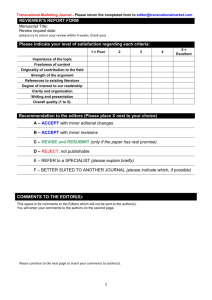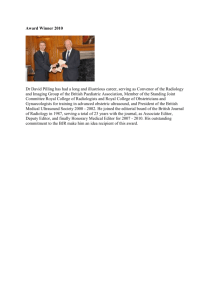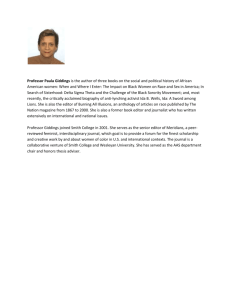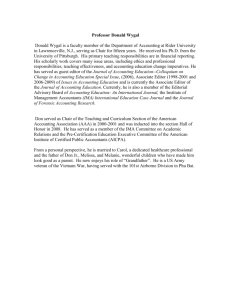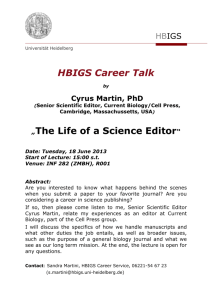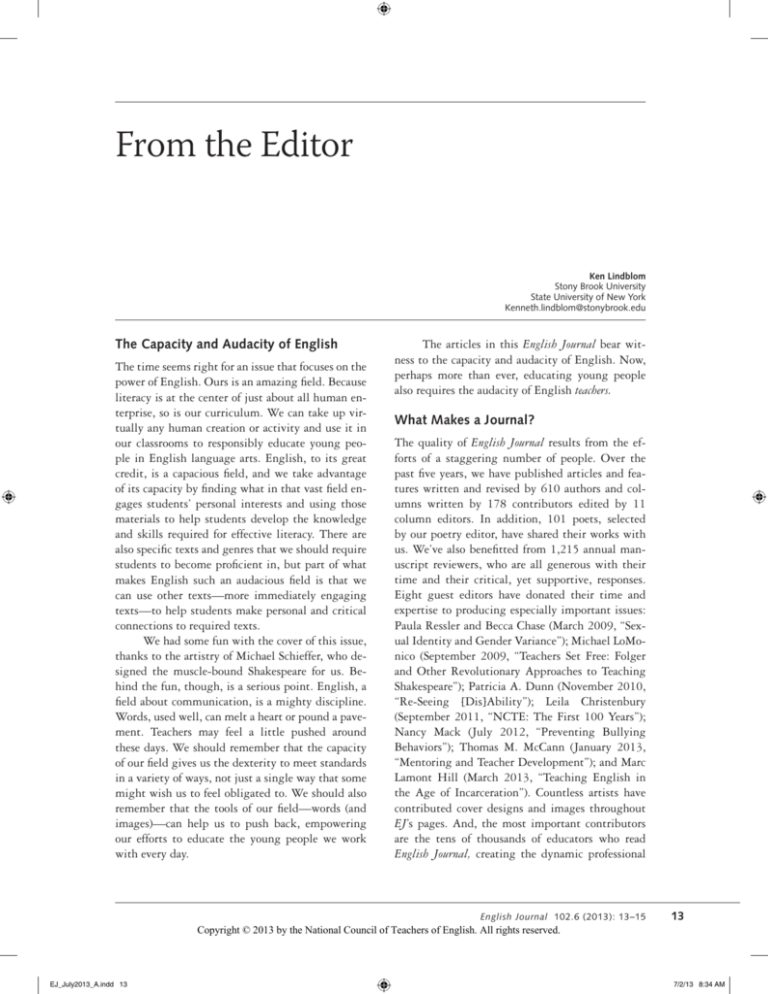
From the Editor
Ken Lindblom
Stony Brook University
State University of New York
Kenneth.lindblom@stonybrook.edu
The Capacity and Audacity of En­glish
The time seems right for an issue that focuses on the
power of En­glish. Ours is an amazing field. Because
literacy is at the center of just about all human enterprise, so is our curriculum. We can take up virtually any human creation or activity and use it in
our classrooms to responsibly educate young people in En­glish language arts. En­glish, to its great
credit, is a capacious field, and we take advantage
of its capacity by finding what in that vast field engages students’ personal interests and using those
materials to help students develop the knowledge
and skills required for effective literacy. There are
also specific texts and genres that we should require
students to become proficient in, but part of what
makes En­glish such an audacious field is that we
can use other texts—more immediately engaging
texts—to help students make personal and critical
connections to required texts.
We had some fun with the cover of this issue,
thanks to the artistry of Michael Schieffer, who designed the muscle-bound Shakespeare for us. Behind the fun, though, is a serious point. En­glish, a
field about communication, is a mighty discipline.
Words, used well, can melt a heart or pound a pavement. Teachers may feel a little pushed around
these days. We should remember that the capacity
of our field gives us the dexterity to meet standards
in a variety of ways, not just a single way that some
might wish us to feel obligated to. We should also
remember that the tools of our field—words (and
images)—can help us to push back, empowering
our efforts to educate the young people we work
with every day.
The articles in this En­glish Journal bear witness to the capacity and audacity of En­glish. Now,
perhaps more than ever, educating young people
also requires the audacity of En­glish teachers.
What Makes a Journal?
The quality of En­glish Journal results from the efforts of a staggering number of people. Over the
past five years, we have published articles and features written and revised by 610 authors and columns written by 178 contributors edited by 11
column editors. In addition, 101 poets, selected
by our poetry editor, have shared their works with
us. We’ve also benefitted from 1,215 annual manuscript reviewers, who are all generous with their
time and their critical, yet supportive, responses.
Eight guest editors have donated their time and
expertise to producing especially important issues:
Paula Ressler and Becca Chase (March 2009, “Sexual Identity and Gender Variance”); Michael LoMonico (September 2009, “Teachers Set Free: Folger
and Other Revolutionary Approaches to Teaching
Shakespeare”); Patricia A. Dunn (November 2010,
“Re-Seeing [Dis]Ability”); Leila Christenbury
(September 2011, “NCTE: The First 100 Years”);
Nancy Mack (July 2012, “Preventing Bullying
Behaviors”); Thomas M. McCann (January 2013,
“Mentoring and Teacher Development”); and Marc
Lamont Hill (March 2013, “Teaching En­glish in
the Age of Incarceration”). Countless artists have
contributed cover designs and images throughout
EJ’s pages. And, the most important contributors
are the tens of thousands of educators who read
En­glish Journal, creating the dynamic professional
En­g lish Journal 102.6 (2013): 13–15
13
Copyright © 2013 by the National Council of Teachers of English. All rights reserved.
EJ_July2013_A.indd 13
7/2/13 8:34 AM
From the Editor
context for our journal. Those who contribute to EJ
take the time to do so because they know their efforts will support many thousands of En­glish teachers and—more importantly—­their students.
Editing En­glish Journal has been the most
profound educational experience of my life. The
workload is challenging—anyone who’s communicated with me in the past five years knows my
emails come fast and furious at all times of day and
night—with unfortunate variations in coherence
and idiosyncratic humor. (Indeed, as I’ve pounded
away at the keyboard very late at night lit only
by the glowing screen, I have occasionally imagined myself instead playing a massive pipe organ
with super-evil-villain music—Bach’s Toccata and
Fugue in D Minor, most often—emanating from
enormous pipes throughout the room: Take that,
you misplaced modifier! How about that scholarly
reference, you unsupported claim!) Other than
these late-night flights of fancy, the primary feeling I get as editor is one of honor. To be able to
help shape national conversation about the most
important profession that exists is energizing and
humbling, and to work with authors—especially
tremendously busy high school and middle school
En­glish teachers—is deeply rewarding.
I encountered En­glish Journal when I noticed
it lying on a table in the En­glish Department Office at Columbia High School, where I was first
hired as a teacher. I could not believe how valuable
a resource it was and that it had been published for
over half a century. The feeling I had then reminds
me of a recurring dream I have in which I suddenly
realize I have wings tucked up under my arms that
allow me to fly, if I just remember they are there.
A few years later, EJ editor Ben F. Nelms
published an article I wrote about engaging students in critical analyses of media representations of
the Persian Gulf War, in which my younger brother
was serving on the front lines at the time. Fifteen
years later, Ben served on the search committee that
appointed me EJ editor, and we developed an especially strong kinship as I tried to get comfortable
with my new responsibilities. To this day, Ben has
been an avid supporter, giver of advice, suggester
of important content, and a brilliant model of editor. I’m delighted that Anne McCrary Sullivan, our
dedicated poetry editor, selected one of Ben’s poems
to include in this final issue of my editorship. As
14
The EJ editor hard at work on the journal. (iStockphoto/
Thinkstock)
I think about my work as editor, helping to bring
national attention to the ideas and expertise of our
colleagues, I am guided once again by Ben, whose
poem reads, “our voices are not our own; we / speak
in tongues we have not learned” (93). The voices in
En­glish Journal are not my own, and I may not have
learned all that I should, but thanks to EJ and its
contributors, I am still learning.
There are other former editors to whom I owe
thanks: Alleen Pace Nilsen has been a delightfully
friendly colleague, and she is an amazing example
of professional activity. Leila Christenbury is one of
the most powerful voices in En­glish education, and
with her wicked wit and abundant empathy, there
is no one on the planet with whom it is more fun to
share professional outrage. I’m also grateful to Leila
for guest editing the September 2011 issue celebrating the NCTE centennial; Leila was the only guest
editor who really knew what she was getting into,
but she accepted my invitation anyway. Louann
July 2013
EJ_July2013_A.indd 14
7/2/13 8:34 AM
From the Editor
Reid is a generous mentor and colleague who did
more than I can describe to get me off to a good
start as editor. I have not worked as closely with
Stephen N. Tchudi, Virginia R. Monseau, Elizabeth
Donnell Nelms, or Kenneth Donel­son (who, sadly,
passed away earlier this year), but I’m grateful to
them for contributing editorial retrospectives to
the January 2012 issue celebrating En­glish Journal’s
100th anniversary and for their lasting legacies.
In addition to the authors, column editors, reviewers, and readers—all of whom I thank sincerely
for their work—En­glish Journal results from the
tireless efforts of a small yet highly talented staff.
Rona Smith, production editor since the Nelms
days, is EJ’s secret weapon; her expertise in publishing and linguistics, confidence-inspiring professionalism, sense of humor, and ever-expanding
patience—I am truly a gifted tester of patience—
are astounding. Senior Editorial Associate Theresa
Kay, who began working with Louann and will stay
on to work with the next editors from her home in
Alaska, is an editorial force. A talented close reader
and editor (and so much more), Theresa deserves
the thanks and respect of all EJ writers: She knows
where all the commas are buried! Closer to home,
Editorial Associates Lauren Esposito and Nicole
Galante have undertaken a million tasks over the
past five years at Stony Brook to keep our issues
on track; both experienced En­glish teachers, their
contributions and perspectives have been immeasurably valuable. Division Director of Publications
Kurt Austin as well as Shellie Elson and Lisa Fink
at NCTE also deserve my personal thanks for their
support. I wish also to thank colleagues at Stony
Brook University who provided funding and other
support through the following units: the Provost’s
Office, the College of Arts and Sciences, the De-
partment of En­
glish, the Professional Education
Program, the Program in Writing and Rhetoric,
and the School of Professional Development. Special thanks to Lizabeth Rehn, Margaret Hanley, and
Dorothy Mason for their enthusiastic support of EJ
and its staff.
Finally, my heartfelt thanks to my favorite colleague and co-author, Patricia Dunn, for her friendship, encouragement, and support, as I’ve given to
En­glish Journal much of the time I’ve owed her these
past five years. I look forward to more collaboration.
The Future of En­glish Journal
It is not easy to step back from En­glish Journal; however, knowing the journal will be in excellent hands
makes it easier. The September 2013 issue will
debut the editorial vision of Julie A. Gorlewski and
David A. Gorlewski. I met Julie when she authored
one of my favorite columns in “Teaching En­glish in
the World” (November 2006), which I edited from
2003 to 2007 at Louann Reid’s invitation. Julie is
a highly experienced high school En­glish teacher
and chair, a well-published and talented writer, and
for five years she has edited the “Research for the
Classroom” column in EJ. She is now a professor at
SUNY College at New Paltz. David, a professor at
D’Youville College and an experienced high school
En­glish teacher, has also served as assistant superintendent, and he has published valuable work in EJ
and in other forums. Judging from their upcoming
themes and columns, Julie and David will provide
compelling issues for our turbulent times. I thank
them for being willing to take the editorial reins. I
wish them luck on what I know will be a very successful term, as I go happily back to being an avid
reader of this illustrious journal.
Ken Lindblom has taught En­glish and writing at Columbia High School (East Greenbush, New York), Syracuse University, and
Illinois State University, and he is now associate professor of En­glish and director of En­glish teacher education at Stony Brook
University (SUNY). He has been editor of En­glish Journal since 2008, and this is the last of the 30 issues he’s edited.
English Journal
EJ_July2013_A.indd 15
15
7/2/13 8:34 AM


